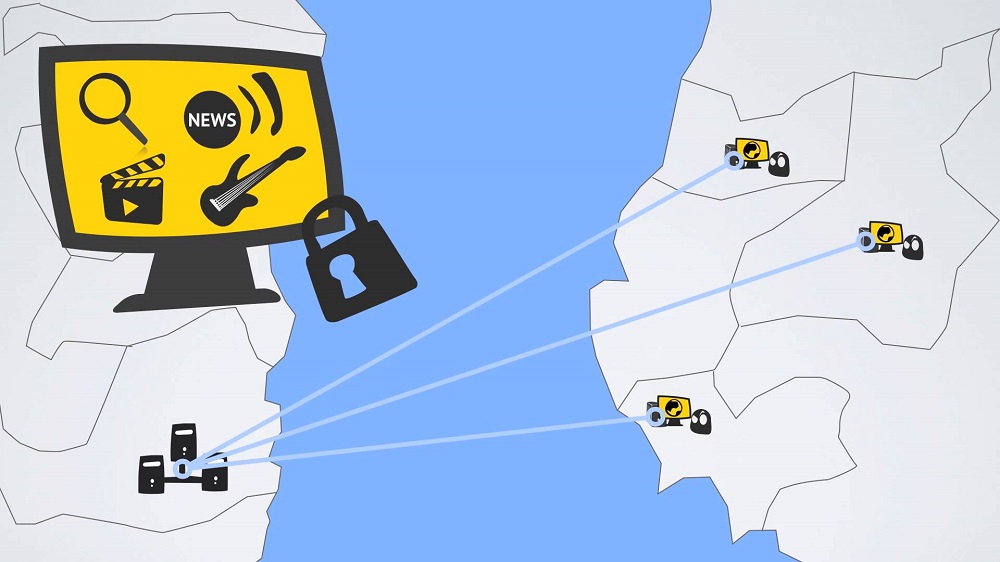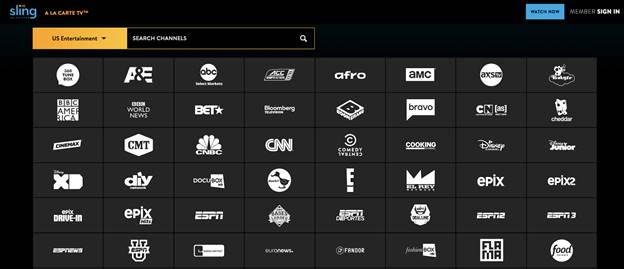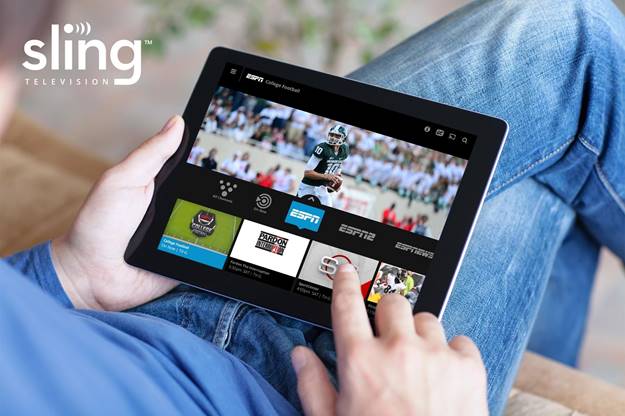
Next Generation Entertainment Services
Traditional television is constantly losing ground in the face of newly invented and diversifying types of entertainment. With the Internet becoming ubiquitous in every home, especially in developed countries, people gained access to video content repositories such as Youtube and on-demand entertainment platforms like Netflix or Hulu.
Among these products are also services like sling-tv, which provide the same scheduled broadcasts as available on cable TV or satellite TV with the difference that these happen over the Internet, without the need to pay for a cable TV subscription and with the possibility to watch content on a range of Internet-capable devices. Sling TV enables many users to save money and still get the same quality content. For some users, it also solves the problem of missing cable TV infrastructure in the region – one can watch Sling TV on a smartphone or tablet using mobile data.
Of course, the shift in the entertainment paradigm towards on-demand entertainment services has the potential to aggravate the problem of habits and dependency. Indeed, on a regular TV, the viewer depends on scheduled broadcasts and would eventually run into less interesting shows, which would lead to a pause. By contrast with on-demand entertainment (such as Netflix or even services that offer previous recordings of a show), it might be more complicated to resist the impulse, and one can watch entire seasons of the preferred show without interruption.
The problem is especially concerning with kids, given that they usually find it more difficult to resist temptations and are worse at projecting the short and long-term consequences of such behavior. On this site, the author overviews the transforming role that digital media had on our society, highlighting the major benefits but also some disadvantages. The greater message is that it is ultimately the final user who needs to adapt to the new reality and treat digital media more responsibly.
The Role Of VPNs For Safe Entertainment
While with services like Netflix, you would be able to access content internationally, with Sling TV, for instance, it is not possible by default given that the service is geoblocked outside the US. As a solution, residents of other countries or US citizens that reside abroad have turned to proxy servers or, more recently, to VPNs to be able to watch Sling TV. VPNs are faster and safer than a proxy and are also a comprehensive solution helping with many other aspects of online activity.
Thus, the crucial advantages that come with VPNs are as follows:
- Enabling access of geo-restricted content. The way VPNs function is by establishing a direct connection between the user and a VPN server of choice located in a country of interest that the user can normally select. This is of great use not only for enabling services like Sling TV, by choosing to route your traffic through an US-located server but also for being able to access local content with services like Netflix, by choosing a server in the country you are interested in.
- Hiding your online identity. Just like proxies, the VPN provider would allow you to use an IP address different from your physical IP, concealing your identity from the accessed website. However, proxy servers are known to be associated with a slow access speed (especially if overwhelmed by many users). Additionally, your identity is known to proxy servers, with all associated consequences. For instance, user data leakage events from such servers are rather frequent. Moreover, a proxy might not be able to hide either the destination or the content of your web traffic from the ISP. With VPN providers, you simply use the infrastructure provided by the ISP to establish a connection with the VPN server from which you can access the entire Internet through safely encrypted traffic. The encryption makes it incredibly hard for all other parties (ranging from your ISP to the government) to “read” the content of your traffic or the websites you access. Surely the VPN provider knows your identity and has the encryption keys, but this is a party whose business depends directly on ensuring your safety with the appropriate approaches, tools, and ethics (unlike with a simple proxy). Also, many VPN providers limit the amount of data stored about you – for instance, many providers have a no-logs policy, which means they disable automatic logging of your online activity.
- Greater surfing speeds in particular situations. It is true that VPNs add layers of complexity to your Internet access through data encryption and rerouting of the traffic through the VPN server. This normally results in a slight drop in your browsing and streaming speeds (with a reliable top provider, this would be insignificant and would not affect the browsing experience). On the other hand, VPNs can allow you to bypass a severe local traffic bottleneck – by simply choosing a less accessed server from your own country; you could reroute the streaming at your will and get better access speeds (provided the speed drops do not come from your ISP). Another speed-related issue can come from the fact that, after the legislative attack on net neutrality in the US, the ISPs can choose to limit bandwidth for accessing certain websites while prioritizing others. If you’d like to avoid splitting your traffic into slower and faster lanes and would like to preserve top access speed regardless of the accessed website, then VPNs do solve this problem perfectly by encrypting the data (and hiding it from the ISP).
Choosing Your VPN Provider
Choosing a VPN provider has to come with a bit of research. One should first understand his or her primary needs from this technology– is it simply to avoid geographical constraints with streaming media or rather, to ensure maximum safety online? Virtually all providers do both, but some are better than others in the first, while others – in the second. Thus, streaming geoblocked entertainment content would be more efficient with a big number of servers distributed in as many countries of interest as possible and with protocols prioritizing speed rather than encryption depth. (Ultra-safe browsing, on the other hand, would require protocols involving very strong encryption keys as well as a “no logs” policy or the availability of a kill-switch feature.)
If entertainment is in mind, it is also very important to consider what types and how many devices you need to cover – smartphones, tablets, laptops, PCs, WiFi routers, TV Boxes, etc.



